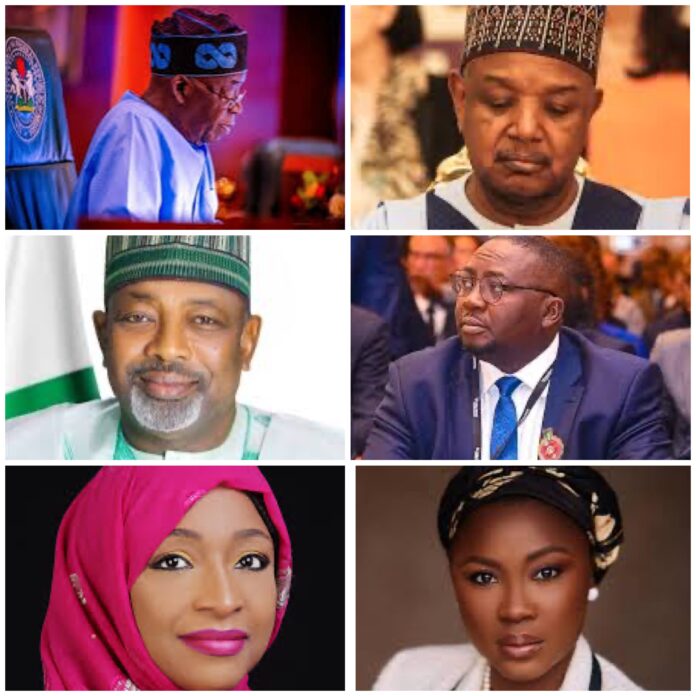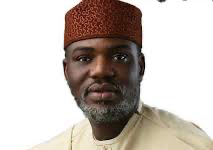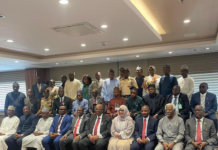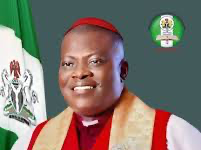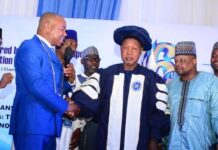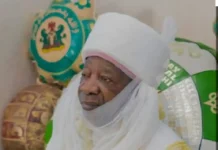UNDERPERFORMING MINISTERS: Meet Tinubu, Bagudu, Adelabu, Dangiwa, Dozen Others
By Kabir Akintayo
When President Bola Ahmed Tinubu assumed office on May 29 last year, he swiftly began implementing his “Renewed Hope Initiative” by expanding the federal government; creating 10 new ministries, bringing the total to 46 to serve Nigeria’s growing population of over 200 million. However, of these ministries, only a few have lived up to expectations, while many have significantly underperformed.
Over a year after, only a handful of the Ministers can point to tangible achievements, underscoring the pressing need for President Tinubu to act swiftly by reshuffling his cabinet and replacing ministers who have not met the mark. This report highlights key ministries that have underperformed and require immediate intervention from the government.
Ministry of Art, Culture, and the Creative Economy – Hannatu Musawa
The Ministry of Art, Culture, and the Creative Economy is one of the new ministries created under President Tinubu’s administration. Despite the enormous potential of Nigeria’s creative industries—especially in music and film—Hannatu Musawa’s leadership has been underwhelming. There has been little effort to harness the creative sector’s vast potential for national benefit. Since her assumption of office, no impactful programs, festivals, or initiatives have been organized to showcase or leverage Nigeria’s rich cultural heritage.
The ministry remains largely inactive, and Minister Musawa must be reminded of the vast opportunities within the creative economy, including attracting investors and generating significant revenue for the country.
Minister of Youth – Jamila Bio Ibrahim
The Ministry of Youth, which was previously combined with the Ministry of Sports, was separated for more focused leadership. Unfortunately, under Jamila Bio Ibrahim, the ministry has struggled to make a noticeable impact. As a young leader, one would expect her to resonate with Nigerian youth, yet there is a palpable disconnect. Fewer than 1% of Nigerian youth are familiar with her or her efforts.
Over a year in office, there have been no notable achievements in youth empowerment, capacity-building programs, or grassroots initiatives. The ministry needs a leader who can genuinely connect with and inspire the country’s young population.
Minister of State for Youth – Ayodele Olawande
Despite being more visible in the media than his principal, Ayodele Olawande has also underperformed. His periodic media appearances and his reiteration of President Tinubu’s successes seem more reactionary than driven by proactive leadership. A more dynamic and experienced individual is needed to spearhead youth and community development initiatives.
Minister of Agriculture and Food Security – Abubakar Kyari
Nigeria is currently in the midst of a food crisis, yet the Ministry of Agriculture and Food Security has remained passive. Food prices continue to soar, and hunger is rampant across the nation, but the ministry’s response has been largely ineffective. Given Nigeria’s vast arable land, the country should not be facing these dire food shortages.
Both Minister Abubakar Kyari and his deputy, Aliyu Sabi Abdullahi, have failed to make a meaningful impact. Their lack of action is underscored by the creation of a separate Ministry of Livestock Development, a move that might have been unnecessary had the Ministry of Agriculture been functioning optimally.
Minister of Power – Adebayo Adelabu
Read Also:
Adebayo Adelabu’s tenure as Minister of Power has been marred by widespread disappointment. Though the rainy season has temporarily masked the country’s power shortages, the underlying issues remain unresolved. The national grid has collapsed five times in just one year—a glaring failure that points to the ministry’s lack of a comprehensive, long-term solution.
Despite Adelabu’s potential, he has not shown the innovation needed to tackle Nigeria’s persistent electricity challenges. His introduction of segmented tariffs (Band A, B, and C), which categorize customers based on access to electricity, is a clear indication that more sweeping reforms are needed.
Minister of Transportation – Sa’idu Alkali
Under Sa’idu Alkali’s leadership, the Ministry of Transportation has been alarmingly inactive. There has been no significant progress in addressing the country’s pressing transportation issues. The light rail project, a major achievement of Alkali’s predecessor, remains incomplete. Additionally, the promised CNG buses have yet to materialize, exacerbating transportation difficulties, particularly in the Federal Capital Territory (FCT).
Minister of Housing and Urban Development – Ahmed M. Dangiwa
One of President Tinubu’s campaign promises was to construct 10,000 homes for Nigerians. However, after more than a year in office, not a single home has been built under the Ministry of Housing and Urban Development. In addition, the ministry has failed to address the chaotic state of the real estate market, where landlords impose exorbitant rent hikes and unregulated agents run unchecked. If the ministry cannot deliver on its mandate, perhaps it is time to consider scrapping it altogether.
Minister of Budget and Economic Planning – Atiku Bagudu
Atiku Bagudu, a former governor of Kebbi State, appears out of his depth in his current role. The complexities of managing the economy demand a technocrat well-versed in financial planning, not a politician more attuned to electoral success. A more qualified expert would better serve Nigeria’s economic interests in this vital position.
Minister of Petroleum – Bola Ahmed Tinubu
President Tinubu currently holds the portfolio of Minister of Petroleum, but it is clear that the demands of the presidency leave him with little time to effectively manage this critical sector. It is time for him to relinquish this role to a competent technocrat who can focus fully on addressing the industry’s challenges.
The Minister of State for Petroleum, Heineken Lokpobiri, has also demonstrated his inability to resolve the sector’s issues. His failure to address the ongoing fuel queues and the tension between Dangote and the Nigerian National Petroleum Corporation (NNPC) further highlights his incompetence.
Other Underperforming Ministries
Other ministries that have been largely ineffective include the Ministry of Steel Development (Maigari Ahmadu), the Ministry of State for Labour and Employment (Nkiruka Onyejeocha), the Ministry of Special Duties and Inter-Governmental Affairs (Zephaniah Jisalo), and the Ministry of Tourism (Lola Ade-John). These ministries have failed to make any meaningful impact, further emphasizing the need for a comprehensive cabinet reshuffle.
In conclusion, for Nigeria to experience the effective governance it desperately needs, President Tinubu must take immediate action by reshuffling his cabinet. Removing underperforming ministers and appointing capable, qualified individuals to key positions will be crucial for moving the nation forward.

